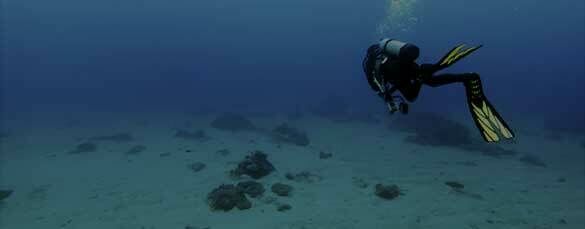Attention Deficit and Hyperactivity Disorder (ADHD) and Autistic Spectrum Disorder / Condition (ASD / ASC) – Guidance for Divers
It is understood that the terms neurodiversity and neurodivergence cover a wide range of disorders, disabilities and conditions. The umbrella term can also be neurodevelopmental disorder, learning/developmental disorder or developmental disability.
This guidance is only concerned with ADHD and ASD/ASC.
Stand alone dyspraxia and dyslexia need not be declared.
However, dyspraxia can include delays and/or impairments in motor co-ordination, movement, balance, learning, organisation and planning. It is possible such impairments may impact the person’s ability to perform some aspects of scuba diving in an accurate and timely manner. However, there is little research evidence and the necessity for input from a Medical Referee may be considered on a case by case basis, if the instructor has concerns.
Each case should be assessed on its own merits with regard to the degree of disability and the potential impact on diver safety and ability to care for one’s buddy. The degree of disability can be highly variable between individuals. However, individuals maybe more adept than average in some tasks.
Diving is not advised in the event of poorly controlled ADHD symptoms. Even if medication controls ADHD satisfactorily, diving is not advised if symptoms return as the medication wears off between doses (a phenomenon known as rebound, which sometimes presents with more severe symptoms than usual), unless the periods of good control can be predicted with certainty and diving is only undertaken within those periods. The effect of time zone changes must, therefore, be considered very carefully when travelling prior to diving.
Screening and advice
Who needs to answer yes to question 13 on the UK Diving Medical Committee (UKDMC) Recreational Diver Medical Declaration form and to contact a Medical Referee?
Only those with ASD/ASC or ADHD who are new to diving and are answering yes to any of the questions numbered 2 to 12 on the Neurodiversity or Neurodivergence Declaration for New Divers form (also available on the Downloads webpage) need contact a Medical Referee.
Established experienced divers who are on no medication and are having no problems diving need not contact a Medical Referee. Established divers on medication will need to contact a Medical Referee as they will be answering yes to question 17 on the UKDMC Recreational Diver Medical Declaration form and will need to declare the medication name(s) and dose(es) and to either state there are no side effects or to describe any side effects if they occur. Those on medication may require depth limits (see below).
Only a single psychotropic medicine (a medicine which affects how the brain works) is allowed as more than one psychotropic medicine will increase the risk of potentially dangerous side effects whilst diving such as susceptibility to narcosis. The individual should be compliant with medication and therapy.
Those newly diagnosed or who have not yet developed effective compensatory strategies may have more difficulty in meeting these standards.
There is a wide spectrum of (dis)ability so some will be a clear cut pass or fail and, even if there is no obvious medical contraindication, the ability to cope will be evident to the instructor.
Not all Medical Referees will have expertise in dealing with younger age groups or individuals with ADHD or autism spectrum disorder/condition and may feel they would be practising outside their area of expertise such that they would be unable to undertake the assessment in some cases.
Face to face assessment in the first instance is likely to be beneficial in those cases that declare yes on the self assessment questionnaire and this is an ideal opportunity to discuss with the diver the implications of the safety critical aspects of diving and potential problems with any medication.
If in doubt Referees may need to liaise with a specialist more experienced in neurodiversity / neurodivergence and diving or more experienced colleagues. If the proposed diver is under a specialist a report may be useful to aid the Medical Referee in their decision.
In cases where the Medical Referee has concerns at the initial assessment such that they require a specialist report from the treating physician (where applicable) to clarify what the diver has declared, it would be useful if the treating physician could address the following questions, indicating any adverse effects on day-to-day living (as these may also impact on safety critical tasks). A positive response to questions 1 to 5 is likely to be required for safe diving. A positive response to questions 6-13 or indication of sedation in response to question 14 may be a contra-indication to diving, although adjustments/restrictions may be appropriate. A form listing the questions below and asking the treating physician to explain any potential adverse responses can be found here. The diver could print off this form and take it to their treating physician.
- Does the individual have the capacity to understand, concentrate and attend adequately to relevant information/stimuli in the environment and social context?
- Does the individual have the ability to follow instructions?
- Does the individual have the ability to cope with stress?
- Does the individual have reasonable time management skills?
- Does the individual have the capacity to consent?
- Does the individual have any problems with memory?
- Does the individual have a diagnosis of learning disability?
- Does the individual have a diagnosis that includes significant speech or language impairment?
- Does the individual have co-occurrence of ASD (autism spectrum disorder/condition) and ADHD?
- Does the individual have any other psychiatric diagnoses (including mental health & personality disorders)?
- Does the individual have support or adaptations in employment or education?
- Does the individual have a recorded history of impulsivity?
- Does the individual have a recorded history of substance misuse (including alcohol)?
- What medication, if any, is required and is it sedating in the individual?
The Diving Medical Referee may be able to consider certifying that they have not identified any medical condition that they consider is incompatible with diving (as stated on page 3 of the UKDMC Recreational Diver Medical Declaration form) if –
- There is no clear contraindication to diving.
- The candidate’s medication (if any) is stable and they are not suffering any side effects that could interfere with diving or have potential side effects that may be exacerbated by exposure to increased pressure such as sedation, narcosis or arrhythmias.
If subsequent diving training proceeds with no problem the diver may not need to contact a Medical Referee again as they will no longer be new divers.
Further progress through diver training may need to be undertaken with more support than average to ensure safe diving practice, including assessing ability to cope with stress and to behave in such a way as to not compromise the safety of other divers. As the diver becomes more experienced these issues are less likely to be a problem. As with all divers, even those with no medical issues, the instructor would not allow them to proceed to open water training until there were no safety concerns. A Medical Referee may be able to indicate on page 3 of the UKDMC Recreational Diver Medical Declaration form that the certification is valid indefinitely unless there is a change in the applicant’s medical condition or medication/treatment (the form provides for this on page 3). Hence annual medicals are unlikely to be needed as some divers fear.
Adjustments or restrictions may be required such as no “no clear surface” diving, no decompression diving or only to dive with more than one experienced buddy depending on the individual circumstances. A depth limit of 20 metres may be advised depending on medication taken to minimise the risk of DCI and the slight theoretical risk that some drugs might increase narcosis.
As is the case with some other conditions, such as increased risk of immersion induced pulmonary oedema or hypoglycaemia in diabetics, the referee may put a note under the restriction part of page 3 that the diver must make their instructor and buddy aware of their potential disabilities/limitations. For PADI forms where there are problems putting restrictions on the forms this should be clearly discussed with the diver and this documented in the medical records so there is evidence the diver has been made fully aware of this.
A list of Medical Referees can be found here.
For more detail and the rationale behind this, if of interest, please view the Guidance for Medical Referees document.
Reviewed 27 May 2024



